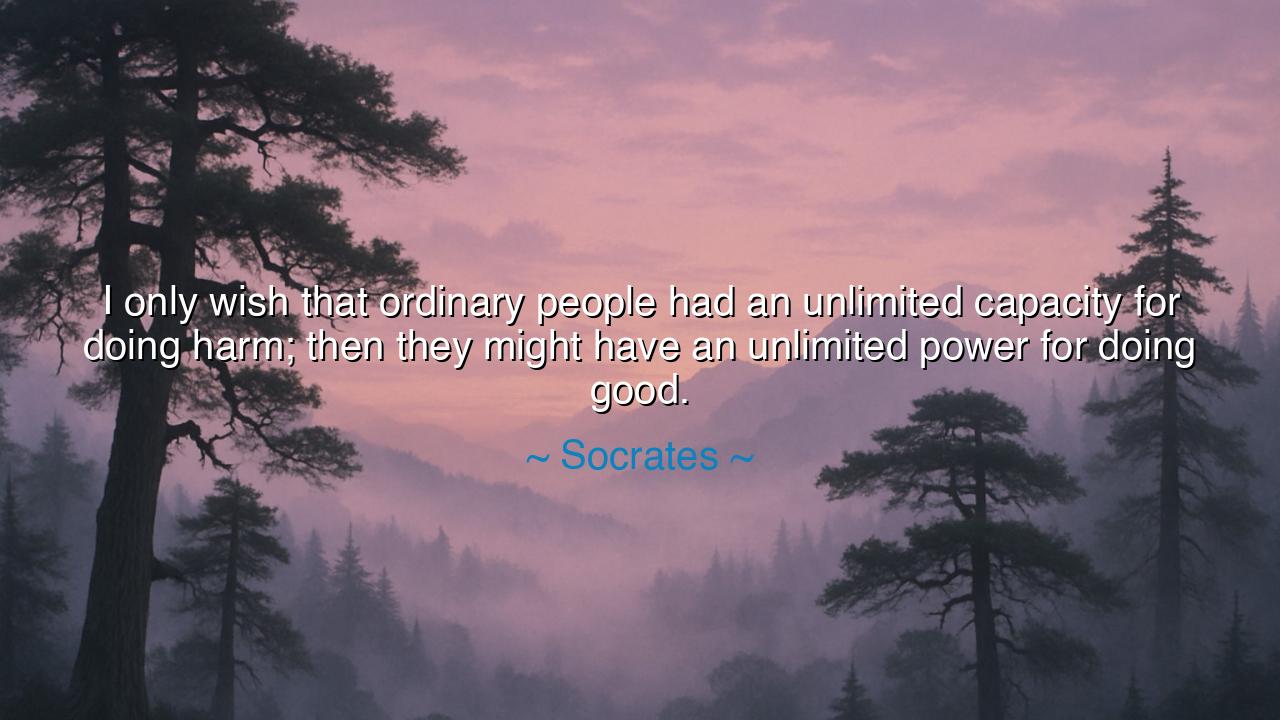
I only wish that ordinary people had an unlimited capacity for
I only wish that ordinary people had an unlimited capacity for doing harm; then they might have an unlimited power for doing good.






“I only wish that ordinary people had an unlimited capacity for doing harm; then they might have an unlimited power for doing good.” These words of Socrates carry a deep, almost paradoxical truth: the potential for good in the world is bound not by the capacity to act, but by the restraint of our actions. Socrates recognized that human beings, in their limited understanding, are often more capable of harm than of benevolence. Yet, in this very capacity for harm lies the potential for greatness. If humanity understood its own ability to cause destruction, it might just as easily recognize the power it holds to create, heal, and build — for in the awareness of harm comes the realization of the vast potential for good.
In the ancient world, philosophers warned that true power is not in the ability to conquer or destroy, but in the understanding and control of one’s actions. The philosopher Plato, in his dialogues with Socrates, often explored the idea that human beings are capable of great evil, but only because they are ignorant of their own nature. It is in the knowledge of our potential to harm — of our imperfections, our fears, our misguided desires — that we can learn the strength to do good. Socrates believed that once people became aware of their ability to destroy, they would also recognize their responsibility to create.
Consider the life of Alexander the Great, a man of incredible ambition and power. In his youth, he conquered vast lands, defeating entire empires. Yet his capacity for harm, when unchecked, led to destruction, violence, and bloodshed. If only Alexander had fully grasped the immense good he could have done with his power — had he used it to unite rather than divide, to build rather than destroy — he might have become not only a great conqueror, but a great leader whose legacy was founded on peace and prosperity. Instead, his inability to recognize the harm in his actions led to the fracturing of the empire he built.
The contrast between Alexander’s conquests and the life of Gandhi serves as a powerful lesson. Gandhi, though not a conqueror by force, possessed a far deeper power in his ability to resist oppression without violence. He recognized the potential for harm in the systems of injustice, but rather than seeking to destroy, he sought to heal. His understanding of the power of nonviolence — the profound strength in good actions — changed the world. Gandhi’s example shows that true power arises not from the capacity to harm, but from the ability to resist harming, to redirect one’s energy into acts of healing and justice.
Thus, Socrates’s words remind us that good is not simply the absence of harm, but the conscious, deliberate choice to use our power for positive transformation. When we understand the depths of our capacity for destruction, we awaken to our greater responsibility to uplift, to nurture, and to create. Socrates teaches that the power of good is within every one of us, and it is only through the awareness of our potential for harm that we come to realize the boundless potential for healing and transformation that lies within us.
In the end, let us remember that power and good are intertwined, and that understanding our ability to cause harm is the first step toward cultivating our ability to do good. Let us use the power we possess to build a world founded on justice, compassion, and peace — for it is in the recognition of harm that we find the deepest call to action for good.






TMtruong truc mai
I’m curious about the psychological aspect of this idea. Does imagining unlimited capacity for harm awaken humility, fear, or responsibility in a person? Conversely, could realizing our potential for good inspire hope and motivation? How can individuals develop the self-control and vision necessary to convert their innate power into lasting positive effects on society rather than succumbing to destructive impulses?
ANDo Quynh A nh
This makes me think about the role of intention in action. If ordinary people could harm greatly, it highlights how much impact even small choices have. Does this imply that cultivating awareness and ethical mindfulness could dramatically increase the good we do in the world? I wonder what practical steps we can take to help people recognize and harness their latent power for meaningful contributions.
QPquyen Phan
I feel intrigued but slightly uneasy about the notion of unlimited capacity, whether for harm or good. Could humans realistically handle such limitless power without losing moral direction? What safeguards, if any, would be needed to ensure that people’s immense potential could consistently manifest positively? I’d love a perspective on historical examples where ordinary individuals achieved extraordinary good by embracing responsibility and self-restraint.
556ktgrcwlhe
I find myself questioning the nature of balance between good and evil within humans. Does having the potential for harm inherently make someone capable of greater good, or does it risk magnifying negative tendencies? Could this idea suggest that moral responsibility is amplified by power, and how might education or reflection help people transform their potential for harm into genuine benefit?
HHoang
This makes me reflect on human potential and morality. If people have the capacity to cause harm, could that same energy be redirected toward doing good? I wonder whether our society underestimates the power of ordinary individuals when it comes to positive change. How can we cultivate the discipline, empathy, and wisdom necessary to channel our abilities toward constructive outcomes rather than destructive ones?